10 Tops Ways to Crush Digital Blue Light From Screens and 9 Great Reasons Why You Want To Protect Your Eyes and Your Health
- Visible blue light is actually quite natural and quite lovely when it occurs naturally, like in a beautiful blue sky on a sparkling sunlit afternoon. The cause for concern is artificial blue light, particularly from screens.
- The problem is we're looking at it when we shouldn't be, we're seeing too much of it and we're looking at it for long periods of time.
Why is Artificial Blue Light From Our Screens Bad?
- It can cause eye strain and vision problems.
- It can suppress melatonin production and stop the melatonin from being released in our bodies.
It's All About The Light Baby
- It all starts with light simulating our bodies to do certain things like wake up and get going and wind down and get to bed. It happens via a nifty nerve pathway that runs from the retina in our eyes to our brains hypothalamus.
- It works like this: light signals amazing center in our brains called the suprachiasmatic nucleus (SCN) to go to work by creating signals to other parts of the brain that control hormones, temperature and other functions, like releasing the hormone cortisol that that plays a role in making us feel awake and alert
- It's light that stops the sleep-regulating hormone, called melatonin, that's produced in our pituitary gland a from being secreted into our bodies.
- If that same SCN is deprived of light, it will stop holding back and start releasing melatonin when the darkness arrives.
-
Is it Bad To Sleep With Blue Light On?
The answer is YES. Believe it or not, blue light from screens or your phone or even coming from a digital alarm clock or an "On" button on your TV, can penetrate CLOSED eyes.
For the Sweetest Sleep Watch Out for any Light
Blue Light has so much power, even closing your eyes won't keep it out--once you're all cuddled in and ready to sleep, make sure to turn all devices off. Research has shown that our eyes can detect blue light, even through closed eyelids—also adding to the repression of melatonin production.
Scientists Found That Blue Light Can Penetrate Closed Eyes.
This research is so interesting we've included their findings, which demonstrate that it's important to sleep in a roomas dark as possible:
Compared to a dark control night, light delivered through eyelids suppressed melatonin by 36% (p = 0.01) after 60-minute light exposure at the beginning, 45% (p = 0.01) at the middle, and 56% (p < 0.0001) at the end of the night. In the second study, compared to a dark control night, melatonin was suppressed by 25% (p = 0.03) and by 45% (p = 0.009) and circadian phase, as measured by DLMO, was delayed by 17 minutes (p = 0.03) and 71 minutes (ns) after 60-minute exposures to light levels 1 and 2, respectively.
And ditch a bright nightlight. Believing daytime has arrived, your biological clock instructs your pineal gland to immediately cease its production of melatonin. Whether you encounter the light for an hour or for just a few seconds, the effect is the same—and your melatonin pump doesn't turn back on when you flip the light back off. When you turn on a light at night, you immediately send your brain misinformation about light and dark.
Melatonin: Great For Sleep. Great For Your Body
- Lack of melatonin has been linked to problems with sleep, and also to inflammation, immune function, and even cancer.
- Melatonin was found to protect the important hippocampus region of the brain from cell damage from electromagnetic radiation (wireless energy) in a study by Devra Davis and Gamze Altun.
How Anti Blue Light Glasses Help Melatonin and Sleep
It appears that seeing any blue light in a particular range can stop melatonin secretion.
When we talk about the nasty type of blue light and all the ways it can mess with our body's wellness, we're talking about a range of blue light in the melanopic spectrum. That would be the light that falls in the 400 to 500 nanometer range. This particular range of blue light on the visible light spectrum has been proven to suppress melatonin.
Timing is Everything When It Comes To Melatonin
The good news is that when we manage our exposure to blue light so that it matches the natural light cycles of day and night, then melatonin can be released in our bodies as it should be.
During the day the pineal gland, where melatonin is produced is basically not active and not creating the melatonin your body needs. When the sun goes down the darkness signal the pineal to turn on by the SCN and begins to actively produce melatonin, which is released into the blood. Usually, this occurs around 9 pm. As a result, melatonin levels in the blood rise sharply and you begin to feel less alert. Sleep becomes more inviting. Melatonin levels in the blood stay elevated for about 12 hours - all through the night - before the light of a new day when they fall back to low daytime levels by about 9 am. Daytime levels of melatonin are barely detectable.
Besides adjusting the timing of the clock, bright light has another effect. It directly inhibits the release of melatonin. That is why melatonin is sometimes called the "Dracula of hormones" - it only comes out in the dark. Even if the pineal gland is switched "on" by the clock, it will not produce melatonin unless the person is in a dimly lit environment. In addition to sunlight, artificial indoor lighting can be bright enough to prevent the release of melatonin.
TOP 10 Best Ways Block Blue Light From Screens
The key to blocking blue light is to know how much you're blocking and "layer it" like sunscreen. As the sun sets, your eyes need to start getting less and less blue light, so that a good 2-3 hours before sleep, you're not getting much blue light if any.
1. Eliminate 35% on your Devices
-
Start by filtering some blue light and digital glare by investing in a Screen Protector that not only protects from scratches but also includes a blue blocking film that goes over your phone, tablet or laptop screen.
2. Filter or Block Around 40% of Blue Light In That's All Around You
-
You can also try the lighter or clear "blue-light-blocking" glasses that are offered just about everywhere these days. Their manufacturers claim that they block around 40% of the higher range of the spectrum. Personally, I absolutely adore these Izipizi blockers because you don't have to sacrifice any style or comfort to protect your beautiful eyes. They come in a ton of different colors and styles!
3. Eliminate up to 65% of Blue Light with Amber glasses
- Certified to Block 65% of blue light in the 400 to 700nm range, these soften and filter some blue light and give your eyes nice relief with amber lenses. This amber tint actually adds clarity and protection. We recommend them for all daytime screen use, especially for kids. Many participants in the study of blue light and insomnia referenced below wore amber glasses two hours before bed and slept better.
4. Eliminate 86% of Blue Light during the day with Orange Tinted glasses
- We like to keep these orange-tinted glasses on our desks to use anytime we want to avoid digital blue light and let our eyes relax. The warm tones really help soften screens as well as block a lot of nasty blue light.
5. Eliminate 96% of Blue Light and Protect Eyes and Sleep with Espresso Glasses
-
When you need the big guns to maximize melatonin production and blue light blocking, go for the ultra-dark lens of these glasses. We use them when it's dark and we're inside under artificial light, watching any screen from TV to YouTube to Hulu or scrolling on our phones. Our go to solution for a good night's sleep: Coffee tinted lenses.

6. Use Software to Adjust the Range Of Blue Light On Your Device
- Install Flux on your computer screen. It can change the color temperature of you screen to eliminate much of the blue light your screen emits, however, be aware that you'll still be exposed to the digital LED lighting that is part of any screen.
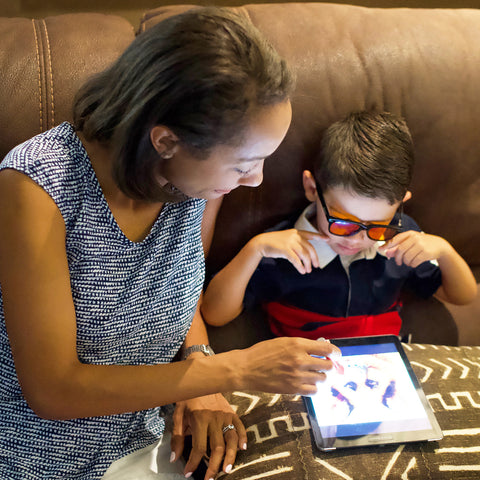
- Give Nightshift a whirl on your iPhone and program it to come on at 7:00 pm. It gives you the ability to adjust the blue light on the screen to warmer tones. You can set it up to come on automatically at any time. Just like with Flux, you won't eliminate the LED lighting from the screen, but the warmer tones will help with the color of light to which you're exposed.
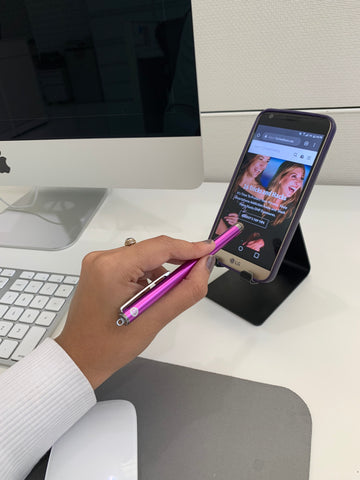
7. For a Good Night's Sleep, Be Mindful of Other Sources of Blue Light In Your Home
- Change bedroom lighting to softer light and ditch the bight night light in favor of warm orange colored light, like a salt-lamp.

- Use screens that are not backlit (like some e-readers). Always try to match the screen brightness to the level of light in the room for less eye strain.This is really great way to decrease eye strain.
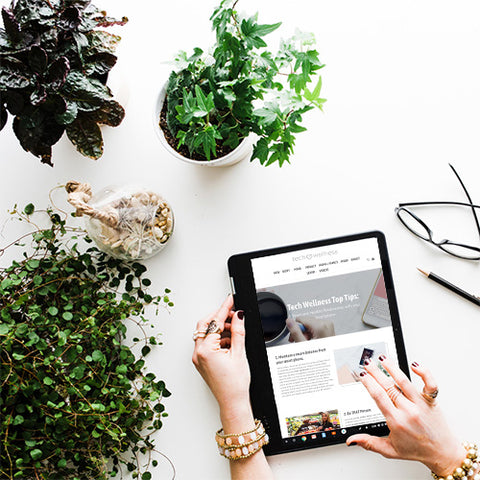
- Mom may not approve, but it's actually healthier for your eyes to watch TV than to read a book on your phone or tablet. The farther you are from a screen, the better it is for your eyes, plus your skin benefits too. Even better: wear orange or expresso glasses while you watch TV.
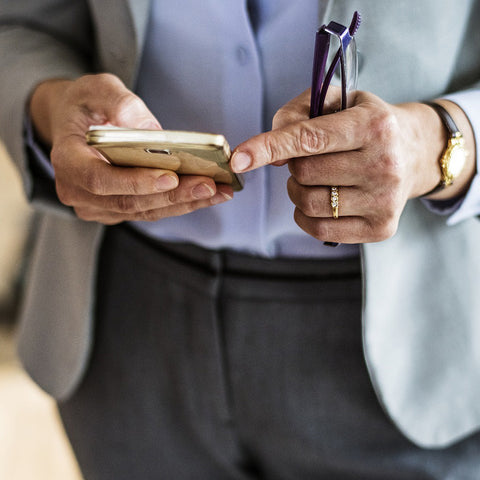
- Be mindful of how close your face is to your cell phone too,not just because of the blue light, but also because your eyes are more likely to be harmed by the intense close-up focus. Set yourself evening time limits on your smaller devices. To further diminish eye strain, try the 20 20 20 rule that CNET talked about in their "How To Avoid Eye Strain Video": for every 20 minutes on the computer, find something 20 feet away and look at it for 20 seconds.
"The most disruptive event in the history of biotime occurred on December 31, 1879 with the invention of the electric light bulb".
Michael Breus, The Power Of When
HOW BLUE LIGHT IS MESSING WITH YOUR WELLNESS
1. Blue Light from Computer Screens Affects Sleep Patterns And Mood
Smartphones and screens emit luminous blue light so you can see the display, even on the sunniest days. However, your brain gets confused by blue light at night, as those azure emissions actually mimic the sun. Makes sense, right?
Blue light suppresses the production of a sleep-regulating hormone known as melatonin. A research project of adults aged 37 to 75 showed how Circadian rhythm disruption had a big effect on their well-being.
2. Melatonin is a Mighty Hormone
Lack of melatonin has been linked to not only problems with sleep, but also to inflammation, immune function, and even cancer. Green Med Info has a stunning list of 415 melatonin studies abstracts.
Robert M. Sargis MD, PhD explains the basics of how our bodies make and use melatonin in EndocrineWeb:
Located deep in the center of the brain, the pineal gland, once known as the “third eye”, produces melatonin.
- The pineal gland produces melatonin, which helps maintain circadian rhythm and regulate reproductive hormones. Pineal cells and neuroglia cells (which support the pineal cells) mainly comprise the gland.
- The pineal gland secretes a single hormone—melatonin
- Melatonin is special because its secretion is dictated by light.
- Light exposure stops the release of melatonin, and in turn, this helps control your circadian rhythms.
- Melatonin secretion is low during the daylight hours and high during dark periods.
We found an entire report linking melatonin to an impressive array of anti-cancer benefits. Melatonin inhibits the proliferation of a wide range of cancer cell types, as well as triggering cancer cell apoptosis (self-destruction). The hormone also interferes with the new blood supply tumors require for their rapid growth (angiogenesis). It can even help chemotherapy be more effective and lower its toxicity.
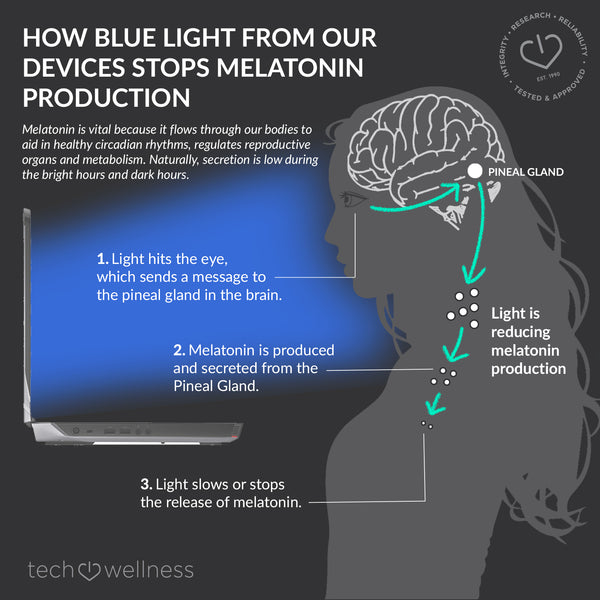
3. Sleep and Insomnia: Blue Light Affects Your Beautiful Body's Time Clock
Bright blue light can also affect our circadian rhythms, our internal clocks. Our circadian rhythms are being talked about a lot lately as a really important key to our health and well-being. Turns out that bright lights in the evening hours can throw off your body clock, confusing your brain into thinking it’s still daytime.
The best way to prevent the blue light from suppressing your melatonin production or changing your circadian rhythms is to cut back on using your phones, computers and tablets at night. The National Sleep Foundation recommends powering down all devices two hours before bed. OR you can try any of these great blue light blocker options Check out the link for curated blue blockers in all forms and price ranges.
A 2018 Research Study from Columbia University reported that,
Wearing blue light blocking amber lenses during the two hours preceding bedtime for one week, resulted in significant improvements in sleep, for individuals with insomnia symptoms (as compared to wearing clear lenses). Specifically, scores on the PIRS (total and sub-scales) were reduced in the amber vs. clear lenses condition, indicating a reduction in insomnia severity.
By the way, PIRS is an insomnia measurement, specifically the Pittsburgh Insomnia Rating Scale.
4. Blue Light and Your Reproductive System
Blue Light will also effect how your reproductive organs work. It's true. Blue light affects melatonin production. The study about melatonin continues:Let's not take any chances on messing with the "natural" function of our ovaries and testes by messing with our melatonin production. Try to keep any digital screen light exposure to hours and times that mimic normal and natural daylight hours.
5. Blue Light Affects Metabolism
Oh my. Your phone can cause weight gain and insulin resistance!? By measuring blood glucose and insulin levels scientists determined that exposure to blue light from LED lighting altered metabolic function! Yikes! And, blood levels showed altered glucose metabolism.
Hunger: The 2014 Study
Ivy Cheung, a doctoral candidate in the Neuroscience program at Northwestern University found that a single three-hour exposure to blue-enriched light in the evening acutely impacted hunger and glucose metabolism.
"These results are important because they suggest that manipulating environmental light exposure for humans may represent a novel approach of influencing food intake patterns and metabolism."
So, should we be staying away from looking at the phone, computer or even a television screen if we're trying to keep our night-time hunger in check? Especially since researchers noticed that just 15 minutes after exposure hunger set in?
Blue Light And Insulin Resistance:
Cheung along with others from Northwestern did a follow up study in 2016:
But more important than Hunger, Researchers Saw This:
"While blue enriched light clearly altered subjective alertness in the evening, the lack of effect on subjective hunger was surprising considering the findings from the previous study showing changes in subjective appetite with morning bright light exposure. . . However repeated daily exposure or exposure in a natural environment (as opposed to a lab setting with controlled food intake and physical activity) may lead to different outcomes more in line with prior field studies.
Major News: Blue Light and Insulin Resistance.
Insulin resistance is a condition we hear a lot about these days. Doctors tell us it's about diet, weight management and physical activity. However, this study at Northwestern shows a strong correlation between blue light exposure and insulin resistance:
"The metabolic response to blue-enriched light exposure was quick: with 30 minutes of blue-enriched light exposure onset, HOMA-IR [insulin resistance index] was 30% higher in the morning and 19% higher in the evening compared to dim light exposure. It is plausible that extended or more chronic exposure to blue-enriched light may further impact insulin resistance, given that HOMA-IR is 50-60% higher in the morning with repeated sleep restriction compared to the fully rested state"
Did you catch that? The insulin resistance reaction got much worse when subjects didn't get a good night's sleep! Who's getting a good night's sleep? Well, chances are NOT those who are looking a screens before bed!
6. Love that Melatonin Baby- So Watch That Light For Healthy Sleep and More
Babies produce and secrete melatonin just like their moms and dads. One study showed mighty melatonin to be present in the saliva of babies just 3 weeks old. In another study, researchers noticed that the melatonin levels began to show a rhythm when the babies were about 2 months old. At 6 months babies secreted about one quarter of the melatonin that adults do.
Both of these studies were evaluating the development of circadian rhythms in infants. They confirmed that melatonin was released (or not) according to the light babies were exposed to.
Natural Light is Best, Baby.
"Circadian rhythms appeared much more rapidly in this infant than previously reported; their rapid appearance was probably facilitated by maximal exposure to sunlight . . .
In fact, the study attempted to replicate natural and normal light patterns that existed before artificial light- meaning that when the sun went down--so did the light that the baby was exposed to.
So mom and dad, as babies develop their circadian rhythm, you can help by keeping their night-time environment as light-free as possible.
8. Teens, Sleep, Depressions and Melatonin
The Journal of Childhood Development released the results of an imperative study in the summer of 2017. They focused on the connection of screen exposure (the digital blue light we've been talking about here) at night and how that affects kids’ willingness to go to bed and their ability to sleep. This makes sense to us at Tech Wellness. Not just because kids are now actively texting, going on social media and having trouble going to bed, but it’s the screens themselves.
Ultimately, the wavelengths of blue light that screens emit, impact kids' ability to create melatonin—which can have emotional effects, as well as keep them from sleeping.
9. Blue Light Glasses and Those Amazing Eyes
Digital eye strain. Just thinking about looking at a brightly lit computer, makes our eyes hurt. UGH! We wouldn't stare at a bright sunlit blue horizon for hours on end. In the same way, our eyes weren't meant to stare at a blue light filled screen all day. But that's what we do. And that screen light is not only full of blue light, but LED light is pulsating or flickering-making it hard on our physiology as well. The digital blue light combination of high amounts of energy and short wavelengths, make our eyes struggle to focus as the blue light scatters.
Eye strain can cause headaches and brain fog among other symptoms.
Our eyes use muscles and like any other muscle in our body and they get tired from over-use. Staring at computers, smart phones and tablets play a major part in your eye exhaustion.
And tired, strained eyes are just the beginning of the digital blue light effects.
Research on blue light and eyes is now revealing a connection to serious vision damage like macular degeneration and even melanoma of the eye.
The University of Toledo released research that identified how blue light (natural and digital) can really harm your vision. Here's an excerpt from the article about the research in the UT News
“It’s toxic. If you shine blue light on retinal, the retinal kills photoreceptor cells as the signaling molecule on the membrane dissolves,” Kasun Ratnayake, a PhD student researcher working in Karunarathne’s cellular photo chemistry group, said. “Photoreceptor cells do not regenerate in the eye. When they’re dead, they’re dead for good.”
Karunarathne introduced retinal molecules to other cell types in the body, such as cancer cells, heart cells and neurons. When exposed to blue light, these cell types died as a result of the combination with retinal. Blue light alone or retinal without blue light had no effect on cells.
“No activity is sparked with green, yellow or red light,” Karunarathne said. “The retinal-generated toxicity by blue light is universal. It can kill any cell type.”
The lab currently is measuring light coming from television, cell phone and tablet screens to get a better understanding of how the cells in the eyes respond to everyday blue light exposure.
It's pretty serious folks.
And, notice that the process happens with any blue light exposure digital or otherwise, so sunglasses are a must-and being diligent about wearing them is even more important than we first thought.
We really love that next the research group plans to study exposure from all screens. Here at Tech Wellness you'll find us wearing our blue blocking glasses just about any of the time we're on our computers. And absolutely all the time when it's dark outside and we're encountering any blue light source at all.
Moms and Dads, it's super important to make sure you're kids eyes are protected. Get some inexpensive blue light blocking orange glasses for your children to wear daily.
So, let's take care of those peepers!
Block Blue Light With Orange Glasses or REALLY Block Blue Light With Espresso
There have been a couple of studies done on the efficacy of the orange glasses. One in 2014 shows that teenagers who wore orange-tinted glasses a few hours before sleep were significantly sleepier than without the glasses.
We put them to the test in our office after 4 pm (which happens to be the best time to start). Lots of team members reported their eyes simply felt more relaxed as they looked at computer screens. I should mention that blue light stimulates your brain—which is a good thing in the morning and afternoon.
Tip: Wear Blue Blockers at Night
The real issue at hand is to avoid the blue light in the evening and at night. Blue light exists in the natural daylight spectrum and is healthy for our bodies--at a "natural" strength, during daylight hours.
We offer these on Tech Wellness. If you want to try the orange glasses, make sure you are getting glasses that have been tested for their ability to block blue light.
Artificial Blue Light and Your Skin
Research shows the blue light glow that’s coming from the screen we’re bending over to look at, is also affecting that gorgeous face of yours! We all know how sunlight affects our skin—the sunlight spectrum consists of UV, visible and infrared light. So, in the visible part of the spectrum lies the blue/violet band known as HEV.
Our Blue Light Screen Protectors Help Block Some Of The Blue Light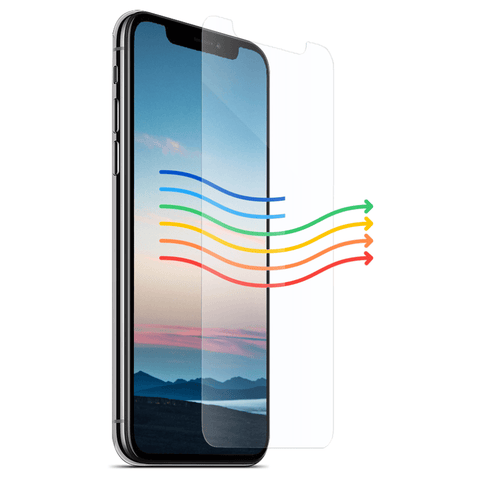
Although HEV is part of daylight, now that our world is overcome with tablets, smartphones, computers, and an overall abundance of technology, we’re getting much more of it and in much more focused doses.
Not great because research is showing that screen glow contributes to aging and revs up hyper-pigmentation! Thankfully we can do something about it. Start with less time in front of your screens, and follow with a special skin care product designed to fight the onslaught of the blue glow.
So here's how I deal with Screens and Digital blue light in my daily life. I've re-set my circadian rhythm so that I automatically wake (without an alarm clock) every morning at 7:15. I try to get an hour of natural light sometime throughout the day. I use an Ocushield screen protector: I like that it protects my skin, my eyes from strain and also from a bit of screen blue light. Then, after 4:00 in the winter and 6:00 PM in the summer, I'll grab orange glasses when I look at a screen. Later in the evening, watching TV or scrolling, I LOVE my dark espresso glasses. They make my eyes feel so relaxed.
Throughout the day, I exercise the healthy screen habits my optometrist shared with me as I discussed the Tech Wellness balance-with-technology mission.- My computer monitor is nice and big and is about 2 feet from my eyes and is positioned so that when I look straight ahead--the top of the monitor is even with my eyes.
- The monitor is angled back very slightly because if I gaze down just 15 degrees my eye muscles are more relaxed.
- I'm all about the 20-20-2 minute rule. Every twenty minutes I take my eyes off the screen and look 20 feet away for 2 minutes--experts say just 20 seconds of looking away is all that's needed to reduce eye strain--but I like to treat myself and think of 2 things I'm thankful for (right now, I'm thankful that you're here).
- I make it a point to adjust my computer screen's brightness to the brightness of the light in the room. I LOVE natural light and always turn off any fluorescent lights I see, but even LED's or nice halogen lights can be annoying and make it hard for my eyes to adjust to the screen. I have a beautiful view of an adorable downtown street out my office window, however, when the sun goes down and I stare right at the glare just past my computer, then it's time for glasses or time to call it a day.

Many of these ideas are part of the American Optometric Association's paper on The Effects of Computer Use on Eye Health and Vision
I would love to hear how you deal with blue light. One of our readers wrote in to share this:
Dr. Merry from a unique research site of doctors and scientists that analyzes the latest scientific research did a deep dive on Blue Blockers and said this:
". . . I think that there is some connection between blue blockers and sleep promotion in select groups, though further work is needed to fully understand this"
They looked at lots of research and found that more clinical trials like the one we talk about from Columbia University in the Blue Light and Sleep section above are needed. Yes, more clinical trials encompassing EMF, blue light and screen time would be so welcomed. We will be happy to include them in our Research section to help you decide what's best for you and your family.
As always, if you have any ideas, please share them with us. Also, if you found this information helpful, please share it with a friend.
Be Well!
August











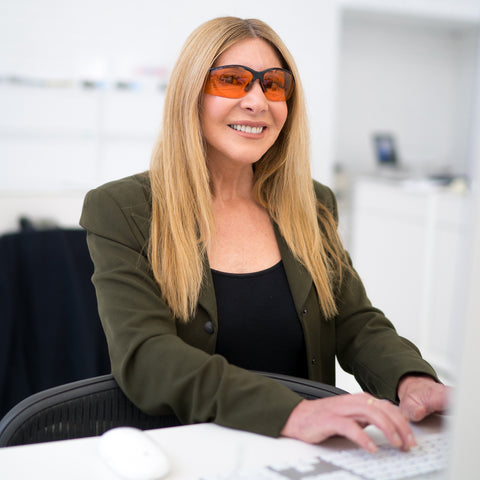
Mary Handly
Can you clarify whether cut would be safe for me to place my cell phone on one of those metal table stands and then use a stylus pen to operate the functions? Also can I hold the metal stand in my hand to use the phone with the stylus pen while lounging where table tops aren’t available?
Thank you for any help in clarifying that to make my life safer and more relaxing while using my phone.